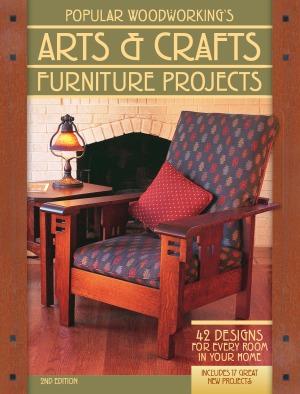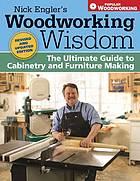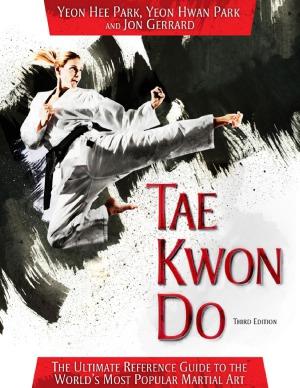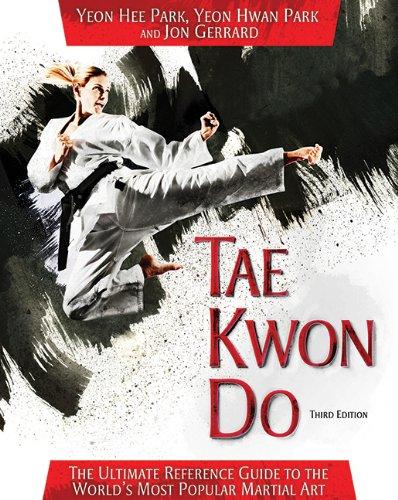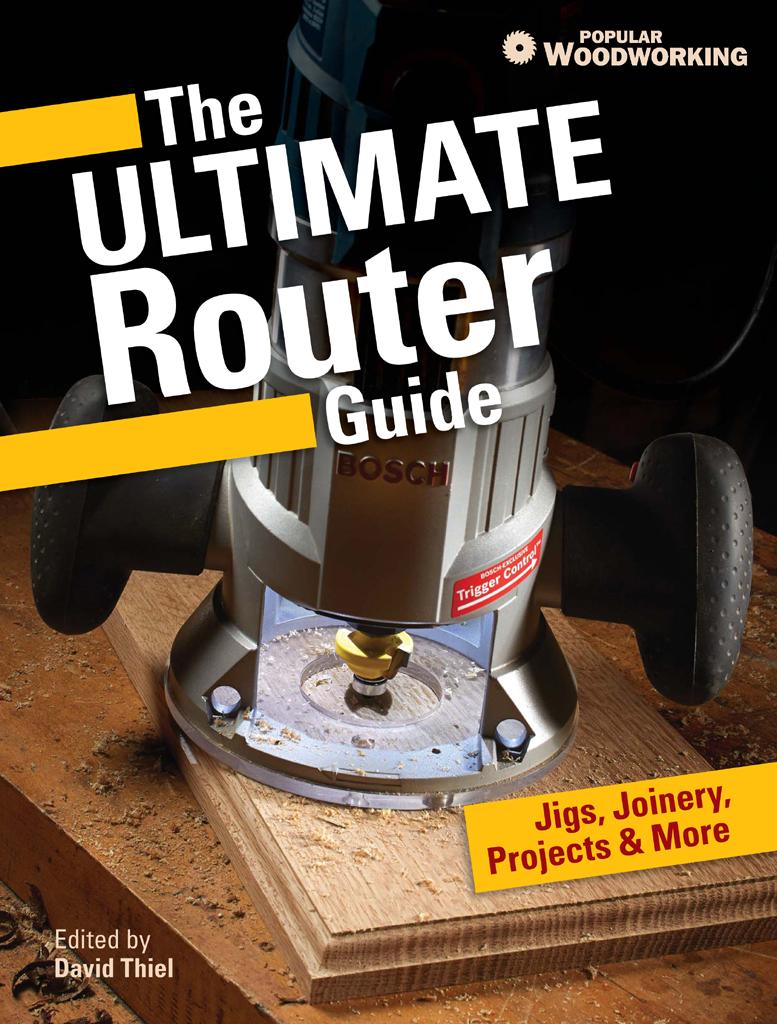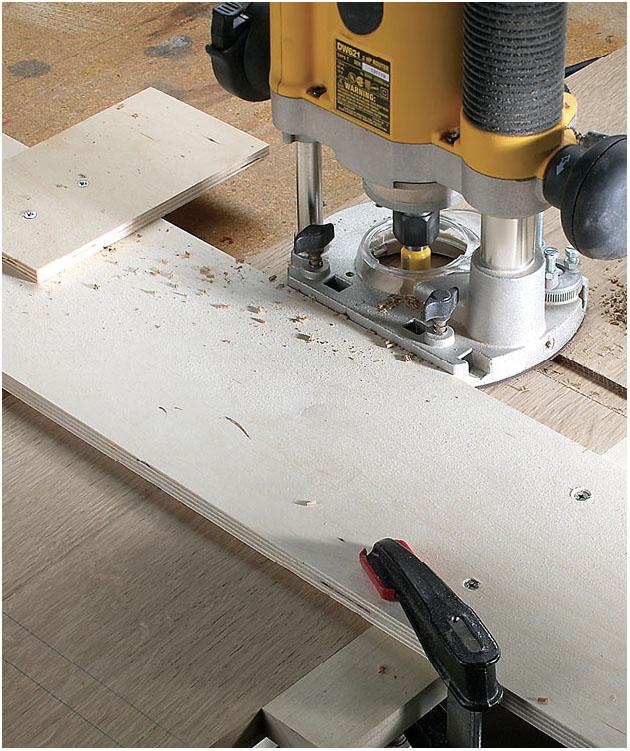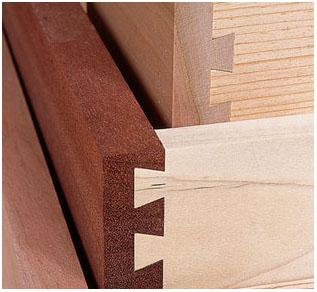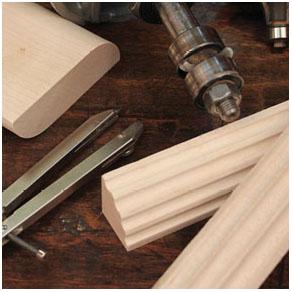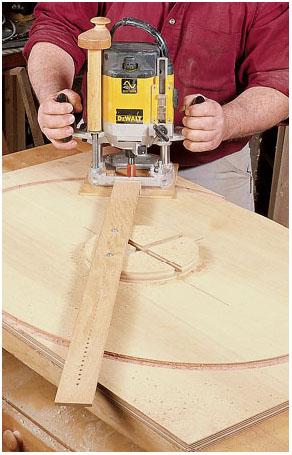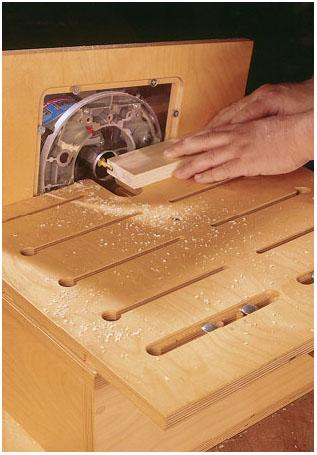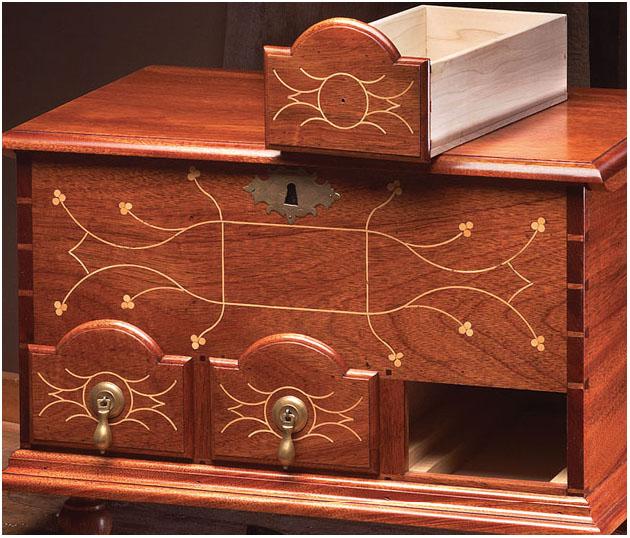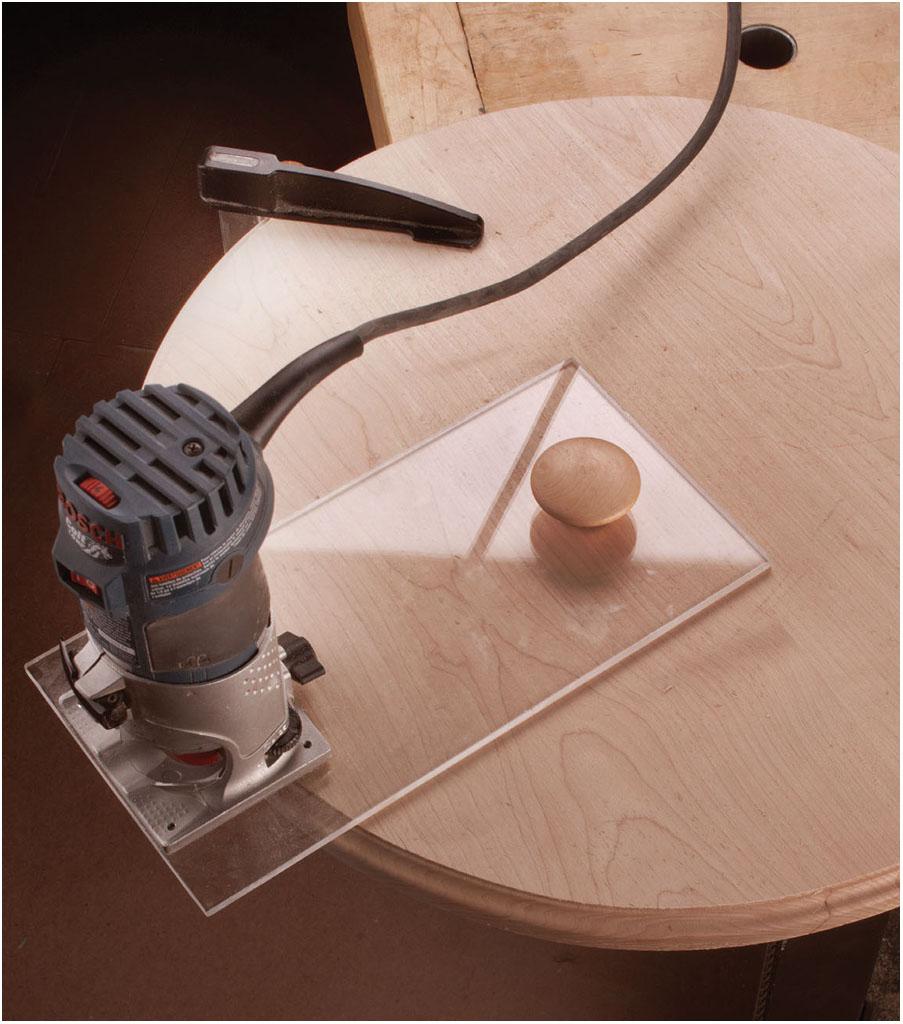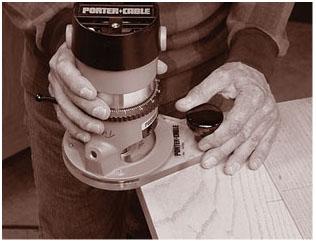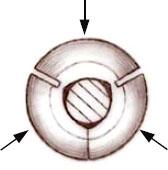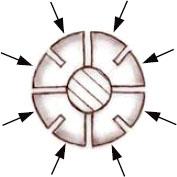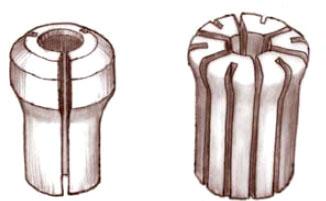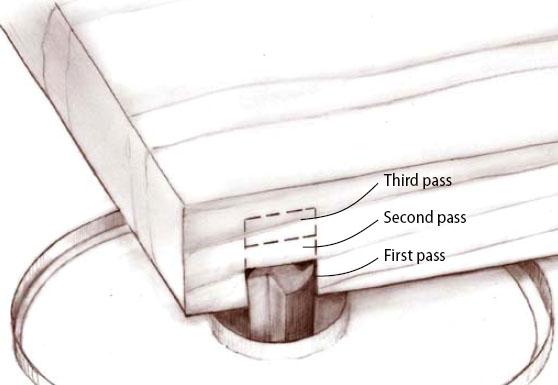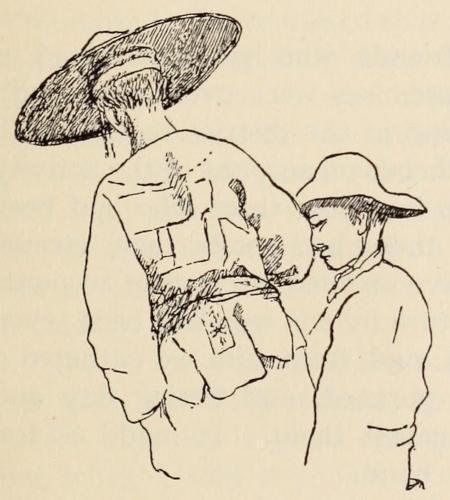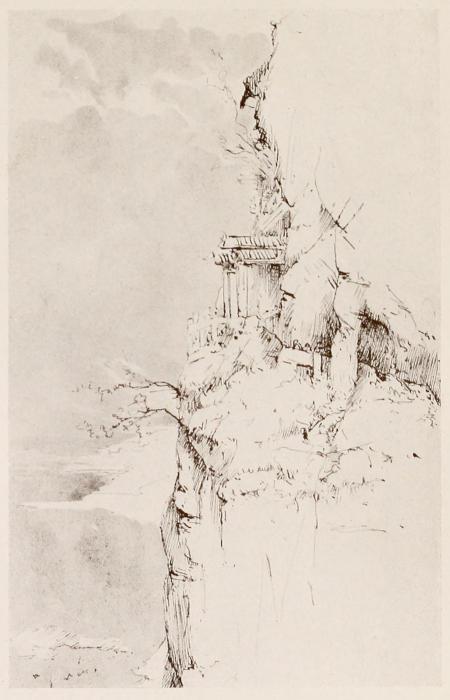Router Features and Capabilities
No matter what kind of router you opt for, there are several features you need to understand that are important in the operation of the tool:
Collet: Although it might seem small and insignificant, the collet is crucial – a poorly designed one might let the bit slip, ruining the cut. To compensate, many woodworkers overtighten the collet, which only aggravates the problem. Overtightening makes the bits hard to mount and dismount, and can cause excessive wear on your tool.
To avoid this, make sure you get a router with a good collet. You can judge if a collet will give you problems by learning how it works. A collet is a split or segmented collar at the end of the arbor that holds the shank of the bit. Tightening a nut squeezes the collar around the shank, locking the bit.
Generally, the more segments on a collet the better, because these make the collet more flexible so it can get a better grip on the bit shank, as you can see in the drawing at right. Routers with multiplesegment collets tend to be a bit more expensive, but the potential headaches they eliminate are well worth it.
Some routers have split arbors, rather than collets. Either way, the same rule applies: the more segments, the better.
Collets come in three standard sizes – ⁄ ", ⁄ " and ⁄ ", which is the measure of the inside diameter. Most router bits have ⁄ " and ⁄ " shanks. If you want to take full advantage of all the bits available, you should look for a router with interchangeable collets.
TIPS & TRICKS
The Need for Speed
Despite a popular misconception, speed controllers will not harm universal motors (the type of motor found in all routers and most hand-held power tools). However, they can ruin induction motors. If you buy an in-line speed controller, be sure you use it for your portable power tools only.
A Better Bit Goes a Long Way
You should put as much, if not more, care and consideration into choosing bits as you would the machines that run them. After all, it’s not the router that does the actual cutting – it’s the bit. A mediocre router outfitted with a better-than-normal bit will cut a lot better than the world’s greatest router with a mediocre bit.
Offset Baseplates Keep Your Router from Tipping Over
Even with half of the router base in contact with the wood surface, it can be difficult to keep the tool from tipping. When you must hang the router over an edge, as when routing an edge detail, make sure you attach an offset baseplate to the router’s base. Keep the offset portion of
the plate over a solid surface and press down on it as you work, thereby steadying the tool.
Some routers have only ⁄ " collets, but come with split bushing so you can adapt them to hold ⁄ " and ⁄ " bits. This is OK, but not as desirable as interchangeable collets.
Power: The type of woodworking you want to do with the router will determine the horsepower you need. If you just want to make a few occasional mouldings and joints, a 1-horsepower router should be more than sufficient. On the other hand, if you expect to do a lot of routing or if you want to use bits with large flute diameters, you should look at 2- or 3-horsepower models.
Speed: Most single-speed routers operate between 20,000 and 30,000 rpm. This is adequate for bits with flute diameters of 2" or less. But larger bits should run at slower speeds; otherwise they’ll overheat and burn the wood.
Three segments - three contact points
Multiple segments - many contact points
Collets with just 2-3 segments (left) don’t squeeze router bit shanks evenly. In fact, they make contact at just a few points. Collets with multiple segments (right) are more flexible and make contact all the way around the shank, which helps keep the bit from slipping.
If you intend to use large bits often, it might be wise to invest in a variable-speed tool or a method of altering the speed, such as a
rheostat or an electronic speed controller. Rheostats reduce the line voltage, which lowers both the speed and the available torque – the ability of your router to do serious work. Electronic speed controllers, on the other hand, have a feedback mechanism that boosts the available torque at low speeds, which means the tool is less likely to quit when the going gets tough.
Height Adjustment: Most basic routers can be raised or lowered up to 2". If you think you’ll need more movement than this, you’ll want to look at the plunge router. But whichever router you choose, consider the ease and accuracy with which you can change the height. Because you’ll be changing the height quite often, you’ll want to make it as easy as possible on yourself.
On some basic routers, the motor housings are threaded in the base so you can screw them up or down. This allows you to make minute height changes accurately. But in some respects, this arrangement is a pain in the neck. Because some on/off switches revolve with the motor, you never quite know where the switch is. And if you mount the router to a table or a stationary jig, the cord can quickly become twisted.
Switches mounted on handles or heights that adjust without spinning the motor remove this concern.
Configuration: For this, you just have to ask yourself how the router feels to you: Is it too heavy or too light when you are holding it and working with it?
Can you reach all the controls without taking your hands off the handles?
Router bases come in a variety of sizes and shapes. The round base found on many basic routers (left) is useful for most operations, but may be slightly inaccurate when following a straightedge. If the base isn’t perfectly round or perfectly centered on the router bit, turning the base (riding against the straightedge) during operation can change the distance from the bit. The Dshaped plunge router base (middle) has one straight side so you can accurately follow both straight and curved templates without concern of changing the distance to the bit. The laminate trimmer (right) has a square base with rounded corners, so you can follow straight and curved templates no matter how you turn it. You can buy an accessory base for the fixed-base router that has a straightedge, too.
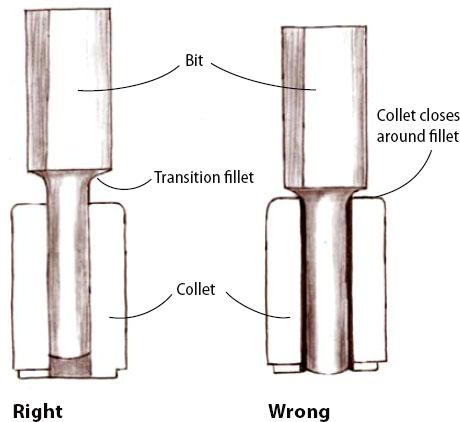
The shank of the bit must be inserted far enough into the collet for the collet to get a solid grip. If possible, the entire length of the collet should contact the shank. However, don’t insert the bit so far that the collet closes around the transition fillet – the portion of the bit where the shank ends and the flutes begin. If the bit is positioned incorrectly – inserted either too far or not enough – the collet may not grip the shank securely and the bit may creep out of the collet when you rout.
Is it well-balanced or does it seem top-heavy and ready to tip?
Routing Rules
The first step in using any tool is to make sure it is properly aligned and adjusted.
For the router, there are only two things you need to check. If you’re using it as a portable tool, check the depth of cut (the
distance the bit protrudes beneath the sole) and the position of the guide (if there is one). If your router is mounted in a jig, check the depth of cut (the distance the bit protrudes past the mounting plate) and the position of the fence (if there is one).
Never “hog” the cut when using a router – the tool is designed to remove only small amounts of stock at any one time. If you need to make a deep cut, rout your piece in several passes, cutting just ⁄ " to ⁄ " deeper with each pass. Generally, the harder the wood, the less you should remove with any one pass.
Once you’ve adjusted your router, you’ll need to keep a couple of things in mind as you work:
• Before you turn the router on, make sure the bit is properly mounted and the collet is secure. When changing the bits, know that you might have to clean dust out of the collet. A dirty collet won’t grip router bit shanks as well.
• Make several test cuts to check your setup; if a job requires several different setups, make sure you have enough test pieces at each subsequent stage to carry you through the entire procedure.
• Remove only a small amount of stock with any single pass. Set your depth of cut to take shallow cuts, usually ⁄ " or ⁄ " deep. The illustration below explains this concept in more detail. 1 8 1 4
TIPS & TRICKS
The Bigger They Are, the Harder They Work
The larger the diameter of the bit, the more the router has to work to turn it. Just because you can fit a 3 ⁄ "-diameter panel-raising bit in your 1 ⁄ -horsepower router doesn’t mean the motor has the proper torque to use that bit efficiently. If the router isn’t equipped to handle the torque load for that size bit, the motor could heat up and burn out.
A Bit of Help for the Collet
To help position a bit in a collet, stretch a rubber O-ring around the shank to serve as a depth indicator. When the bit is inserted, the O-ring will prevent the bit from dropping down too far in the collet.
Platforms Help with Mortises
If you are routing a large mortise or removing stock from the interior of a board, your router could become increasingly difficult to balance as you cut away more of the supporting surface. This is even more of a problem with smaller-base routers such as a laminate trimmer. To compensate for this, use a platform (attached to the router base as a sub-base) to form an oversized router sole – this
Another random document with no related content on Scribd:
happens. The prisoners can earn money—if they work sufficiently well—which is placed to their credit for payment when their sentence is up.
The prison system was appalling in China previous to 1912, but it was then decided that it must be radically changed. It was reckoned that it would take seven years completely to re-model it in the twenty-two provinces. I have only seen one other of these new prisons at Tientsin, and it was not nearly so attractive as the Taiyuanfu one, but still worthy of imitation in many European countries. It had a sort of chapel in which moral addresses were given, but, it is only in the one at Changteh—under General Feng’s jurisdiction[14]—that a chapel was to be found where missionaries had regular services, each mission being responsible for a month at a time, in rotation. The Chinese Government has no small task still before it, for it is estimated that a sum of at least $24,000,000 will be required to provide the new gaols, besides which the Government scheme provides reformatories, Prisoners’ Protection and Aid Societies.
So much is said at present in the European Press about the disorders and misgovernment in China, that it is only fair to let people know that a steady tide of reform is flowing on at the same time, which will render possible a great forward movement when once there is a settled government. Not only are there new gaols, but new barracks, and a large military hospital of which the M.O. is a fine capable Chinaman, trained in the Mission Hospital; he is always ready to lend a hand there still when needed. I was interested to see him doing so one day when the young Chinaman in charge had a serious operation to perform, and if comparison were to be made between that and some European ones I have seen, it would not be in favour of the latter. The mission-trained Chinese are the only men capable of carrying out many of the reforms now taking place in China, owing to the dearth of trained Chinese. The Governor has sent nine students, selected by competitive examination, to study medicine at the Tsinanfu Christian university,[15] and 100 to France to study textiles.
One of the latest reforms of Governor Yen is particularly interesting: it is the power to make his will known in any part of the 70,000 square miles (or thereabouts) of Shansi within twenty-four hours. Considering that the railway line only runs up to Taiyuanfu— seventy miles or less through the province, and that the telegraph wires coincide with it—this is a truly amazing achievement. It is managed by means of telephone and of fast runners.
The mineral wealth of Shansi is phenomenal, and Baron v. Richthoven estimated that its coal would supply the whole world for several thousand years. Anthracite and iron are found in large quantities, besides other minerals. Given, therefore, a stable government and a progressive Governor like Yen, the province of Shansi is capable of becoming a most important place, in fact, of world-wide importance.
The difficulty of transport is one of the main drawbacks at present, and the loess formation is not only a bar to this, but also to irrigation of Taiyuanfu, owing to the curious ravines, sometimes as much as a hundred feet deep, through which traffic often passes, and the sides of which may at any time give way, burying the luckless travellers beneath them. The Governor has sent to England to buy 100 second-hand Government transport lorries, and no doubt he has plans for overcoming the difficulties, if only he is left in peace to develop them. He was formally proclaimed “Model Tuchun” by the Chinese Government in 1918, and although he is not yet forty, has proved himself one of China’s ablest governors.
Chapter III
The Province of Yünnan
“International life—a product of science, industry and economic relations—is hardly yet born; yet it is daily becoming a more and more comprehensive reality, including within its sphere items whose numbers and importance are steadily increasing. Nor is this common life merely international. Might not one say that it is also inter-ethnic, in the sense of embracing the most diverse races, not only in Europe, but also in America, Asia and Africa? Over the whole globe we are witnessing the spread and propagation of ideas that are also forces—motor ideas, which are everywhere identical and are drawing very different minds in the same directions.”—A����� F�������.
Chapter III
The Province of Yünnan
Yünnanfu, the capital of the province, is a most fascinating place and situated in a most lovely district. I visited it thirteen years ago, before the coming of the French and their railway, and found it very interesting to study the changes which have taken place. These are important, but not so deep-reaching as in other cities, and I asked myself what the reason was.
There has grown up quite a foreign suburb round the station, and there are French hotels, in one of which we stayed—the Terminus. There are plenty of shops there, full of the cheaper kind of European goods; but beyond this small area French influence does not seem to extend. It seems out of harmony with the Chinese psychology, and
CHAIR COOLIES
all tha t we he ar d ab out the ir rel ati on s wa s dis ap poi nti ng. Th e rail wa
y has been useful for trade purposes, but has not promoted a good understanding between the races. The management of it leaves much to be desired in every way, and there is constant friction between the French and the Chinese.
It is extremely desirable that France should be represented in China by a different quality of people from those at present in Yünnan: the bulk of them entirely ignore the French traditions of courtesy and treat the Chinese as a lower and subservient race; almost they look upon them as if they had been conquered. It is a tragedy that Westerners should invade any areas against the will of the people, and still further increase the ill-will by their lack of
manners in daily intercourse. Of course it is not only French people who do this, but Europeans of every kind, and the day of reckoning will surely come.
We went to see our missionary friends, who had entertained us on our last visit, and found their premises were overflowing with guests, as all the missionaries working in the district to the north and west had been called in by the officials on account of the activity of the brigands. In fact we met no less than three who had been prisoners in their hands. Two of these had made their escape, with hairbreadth adventures, and gave us most interesting accounts of these people. We also heard a lecture by one who had been seven weeks in the hands of the brigands, and from him we gathered a vivid picture of their life; always pursued, and fleeing day and night from the soldiers sent out against them. It made us feel much sympathy for that particular band.
Many brigands are disbanded soldiers who have taken to the life as a last resource. Their pay was rarely forthcoming, and they have been not infrequently disbanded with no means of earning a living. The captain of this band is a modern Robin Hood, with certain chivalrous ideals and strict in enforcing discipline. He treated his prisoner with consideration, allowed him to ride his beast while he himself walked. Mr. S. had to endure the same hardships as the robbers, but no more; the hardships were, however, too great a strain on his health, which speedily gave way, and he was very seriously ill by the time he was rescued, as the result of urgent remonstrances of his American Consul.
His robber guards treated him with genuine kindness and lent him their wraps at night to keep him warm. The chief was very anxious that Mr. S. should mediate with the Governor of Yünnan on his behalf, and promised that he and his men would settle down to a peaceful life, if they might have a free pardon for their past misdeeds. They had got a considerable amount of loot shortly before, which may have influenced them in this. He also offered to make Mr. S. his chaplain, with a salary of a thousand dollars a month and six months’ salary deposited in advance in a bank in Yünnanfu! He promised that all his men should become Christians: some of
them certainly were in sympathy with Christianity But Mr S. knew that it was impossible to succeed in obtaining any favourable terms for the robbers, and declined to attempt it. A French abbé, at great personal risk, got permission to visit the sick man and was the greatest comfort to him, but the abbé told me that he never expected to be allowed to go away. What the reason of the robbers was for leaving the abbé at liberty is decidedly obscure.
Mrs. S. had begged the robbers to take her prisoner with her husband, but they refused, as in the case of another missionary’s wife. This was a great encouragement to us, as we were women; but when I told it to our young interpreter, he asked tragically, “But what about me?” and was by no means reassured when I pointed out that he was neither a man of substance nor of political importance, and so need have no fear.
The captain of the robbers was extremely particular with regard to the treatment of women and girls by his men. They were strictly forbidden to molest them. On one occasion, Mr. S. told us, the parents of a girl came to complain that a smart young fellow had taken her from their home the night before. After inquiry into the matter and finding that the accusation was just, the captain had the culprit taken eighty yards up the road and shot, all the band being witnesses and obliged to pass the dead body as they left the village where this happened. I quote this story because we so often heard ghastly stories about the ferocity of brigands that justice seems to demand that something be said in their defence. If there were a better Government, brigandage might soon be put down, as may be seen by the fact that it has entirely ceased in the province of Shansi, under Yen Hsi Shan’s wise rule.
We stayed for ten days at Yünnan and saw many interesting things while the preparations for our journey went on apace. As soon as we had got permission for it we ordered chairs, which had to be made, and looked out for a cook. By means of the Y.M.C.A. we got an admirable one, called Yao. The Y.M.C.A. is run by Americans and is mainly educational in character at Yünnan: they have a charming Chinese house for their premises, but look forward to the day when funds will be sufficient to have an American one!
One of the most important pieces of work done by foreigners is the C.M.S.[16] Medical Mission, and they are building a fine new hospital besides having a beautiful native house in the city. Dr. Bradley told us of the successful work done in curing opium smokers, who wished to break themselves of the habit. A wealthy young official had presented complimentary tablets in gratitude for his cure. The work was rather in abeyance pending the completion of the hospital.
There is also a fine, well-managed French hospital for Europeans, but it is not in the railway suburb, as it was built a great many years ago, before the railway was built, in the days when the French were first getting a footing in the province.
But the most interesting thing to us of all the things we saw was the Chinese Home Mission—a Society formed in 1919, by which the Chinese take up the evangelization of China as their own special duty. This is as it should be. The time has come when the burden of responsibility should begin to be taken up by the Chinese Christians, because it is of paramount importance that Christian mission work should cease to be looked on as a foreign institution. The Chinese Church of the future is beginning to take shape, and must grow in accordance with national needs. It is to be the outcome of the honest hard spiritual work of many sections of the Christian Church, but the copy of none. It is of happy augury that in this particular section seven members of the party represented the Presbyterians, Methodists, and American Board; while twelve different societies are represented on their advisory board. They have not so far formulated any creed, but have gone out rather as pioneers to learn the needs of the people and the way in which they can best work. They will then report to those who sent them. Not only are Christians of all churches supporting the movement financially, but also nonChristians show a great interest in it. The chief of the Governor’s staff in Yünnan wrote most cordially, welcoming their coming and promising to help them in any way he could. The missionaries have all done the same, and they are now working most happily alongside one another. We went to call on the two ladies of the C.H.M. settled in the city, the others of the party being unfortunately some distance away in robber-ridden areas of the country Miss Li Ching Chien and
Miss Chen Yu Ling have a girls’ school in a charming old temple building, and we found about thirty girls there, some having a lesson in the classics, others doing needlework. They are drawn from the exclusive upper-class families, whose doors are rigorously closed against the foreigner. They are glad to have their daughters instructed in Western knowledge, even if it does include Christian doctrine. The teachers told them in the opening ceremony that the main object of the school was to promote Christianity. They did not speak much English, but we took our interpreter, who was pleased to find he knew one of them in Peking, when she was working in the North China Union College for Women. They told us how they now visit in more than a hundred houses, owing to their school work, and are allowed to talk freely of the message, which is their chief aim. On Sundays they hold a service in their house and a Chinese pastor preaches: to this service men come as well as women and girls.
Meanwhile the men of the Chinese Home Mission have been visiting different parts of the province, Pastor Ding Li-mei going as far as Tengyueh, on the western border of Yünnan. He not only made a careful survey of the various districts, but also preached wherever he went. He is a man of high repute, one of the most successful and widely known evangelists in the East of China. His wife had taken up kindergarten work in the capital, as that has been her special line. Another of the party, Mr. Sang, went to visit a large tin-mining district in the south, and made a survey of Ku Chin, a prosperous city. The people of the district are greatly addicted to opium-smoking, which is on the increase. The Southern Government, which is supreme in Yünnan, openly encourages opium-smoking. There is no missionary work going on in this part of the province at present; in fact, there are not a dozen mission centres in the whole of this huge province, 146,680 square miles, with an estimated population of twelve millions. No wonder that the Chinese Home Mission felt that this was the place where they were most needed; hence their decision to start work in Yünnan, hoping to extend their work to other provinces. Another of the party, Mr. Li, visited the northern part of the province, crossing the border into Szechuen. At one place he found a group of Christians, who begged him to become their pastor.
The work of the C.H.M. is gradually getting organized and has promise of a fine future; its inception was mainly due to women, and they seem destined to play an important part in it. Chinese women have initiative and great staying power. One of its chief promoters was Dr. Mary Stone,[17] an able Chinese doctor, whose reputation is known throughout the empire. In her interesting book, Notable Women of Modern China, Miss M. E. Burton gives a graphic sketch of Dr. Stone’s life, from the time when her father brought her as a child of eight to an American lady doctor, saying, “Here is my little girl. I want you to make a doctor of her.” She grew up to be one of the people who tackle hard jobs of every kind and who inspire others, as in the case of the Chinese Home Mission. And the success of the Mission can only be secured if others take their share in it, for “they also serve who only stand and wait.” A charming instance of this came to my notice at Amoy. A friend took me to visit an old pastor and his wife who had just celebrated their combined birthday of a hundred and fifty. They said to me, “We are too old and infirm to carry on our work, so now we have set ourselves to pray for the Mission, and every day ten of us meet together for the purpose, and we give what little we can.” I told them I was going to see the ladies at Yünnan, and they were pleased at the thought of sending a message direct. Miss Li and Miss Chen were no less pleased to receive it.
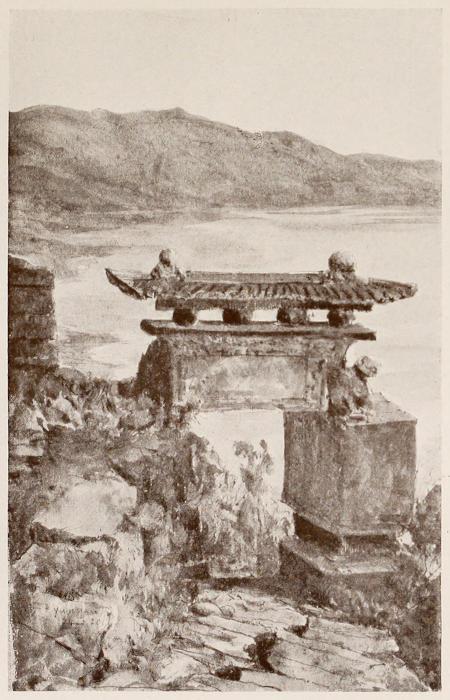
The Pilgrim Way, Yünnanfu Lake. Page 74
In Cloudland. Page 74
There are in China some hundred and twenty different societies at work, but I venture to think that there is still room for many more Chinese workers, if not societies. At Yünnanfu I talked to an old and
experienced missionary,[18] and he told me that he is convinced that the Chinese are best reached by their own people, and that now he confines himself almost entirely to superintendence and organization, while he has an ever-increasing number of evangelists who do all the speaking and teaching. It seems clear that the Chinese themselves feel the need of this support, seeing that the Chinese Home Mission has elected to have a foreign advisory committee. It is also essential to have foreign training centres, such as Dr Keller’s school at Changsha (see page 152). At present the training of these men is often most inadequate, owing to the difficulty and expense of sending them long distances to the schools, especially from the less accessible mission stations.
We did not spend all our time in the city, while preparing for our journey eastward. Once again the lure of the lake came irresistibly on me, and we sent our interpreter to engage a boat in advance to take us across to the celebrated shrines. It is a long day’s expedition and requires strong rowers. When we reached the spot, by ricksha, from which we were to start, the boat proved quite unsuitable: it was so heavy that it would have taken all day to get across. The only thing was to make a fresh bargain for something more suitable, and we were amused to find that it was women only who seemed to be in charge of this trade. A pleasant, hefty-looking woman undertook to do the job to our satisfaction, and we were soon gliding across the smooth waters. There were many heavily-laden boats with lovely sails and as picturesque a crowd of passengers as you could wish to see, who were crossing the lake either to or from the city. Other boats were employed in fishing. The air was most lovely and the colouring of lake and sky and mountains a dream of beauty. Our two men and two women rowed like Trojans, and in two hours we landed at the foot of fine crags on the further shore. We climbed up a steep zigzag path, often up a rock stairway, through the pine-trees. The air was filled with the scent of roses, and the birds sang; nothing disturbed the delicious stillness of the place. From time to time we reached a shrine where the devout pilgrim worships, and always found a terrace or balcony with stone balustrade on which were perched quaint carved beasts, and from which there was a glorious
view across the shimmering lake. Sometimes we passed through fine carved gateways, and we found the thousand steps rather long and weary! At one shrine a young acolyte, suffering from hip disease, prepared tea for us, before we attacked the topmost stage of pilgrimage. This led by a passage cut in the face of the rock to a very lofty little shrine, where squirrels were sporting among the overhanging shrubs. We entered the dragon gate, over which was inscribed the legend “Blessing to all who come.”
A party of Chinese women had actually climbed all the way up on their tiny feet and welcomed us with charming courtesy. After they had chatted for a few moments they turned in absorbed interest to their religious duties: cash were dropped in the box, incense lighted and due obeisances and prayers offered to the god carved in the solid wall of rock.
The view from the terrace was sublime, and far below the water was dotted with white sails that looked like insects on its surface. The overhanging cliff was of great height, and there was a sheer drop of hundreds of feet to the narrow belt of cornland on the margin of the lake, whose further shore was lost in the midday haze. The lake is called K’un-Yang-Hai; it is forty miles long and from five to eight miles wide; no wonder the people call it the “sea”! As we came down we noticed some scribbling on one of the temples “against Japanese goods,” with a rough drawing of a man with a pistol. Everywhere this hatred is shown in one form or another.
We had much interesting talk with an Englishman in our hotel, who had been there for more than six months trying to establish trade relations with the local authorities on behalf of his firm. The mineral wealth of Yünnan is proverbially great: it has rich mines of gold, silver, copper, iron, lead, coal, zinc, tin, and also salt and petroleum wells. The ores are of good quality and easily extracted, so that Yünnan has boundless wealth, if she chooses to develop it. But the Yünnanese are thoroughly unprogressive and a lazy, lethargic people, very different from other Chinese. The officials absolutely declined to sell their raw products, and it was precisely the ore which the English firm wished to buy: it was quite useless in its manufactured form. Their envoy hoped to have completed his
business in a few weeks, but months had already elapsed, and although he thought the end was in sight, it was still a matter of uncertainty. Probably a substantial bribe would have accelerated matters; but not only is bribery unworthy of our trade traditions, but in the long run injurious to trade itself. The trade relations of China are by no means easy, and all nations are bidding for special facilities.
What a pity that the world as a whole cannot be converted to the policy of Free Trade! What a clearing of the moral atmosphere it would make; and what temptations would be saved to frail human nature!
Nine days after reaching Yünnanfu we started on our journey eastward. No one who has not experienced it can imagine the thrill of delight with which we set forth in search of adventures! We said good-bye to many helpful friends, got all our papers in order, and a letter of recommendation to the Governor of Kweichow; at an early hour of the day an escort of ten white-uniformed soldiers was waiting outside, ready to accompany us. We had seventeen coolies, and looked quite an imposing procession. First came our two four-bearer chairs, then the interpreter’s three-bearer chair, the cook’s twobearer chair (it is important to preserve the etiquette of position), and finally four coolies carrying the luggage; part of the escort led the way and part brought up the rear.
How amusing it is to see the way in which human nature asserts itself, and how many are the little comic touches of travel, which are too small to enumerate, but which lend such charm to daily life, when you have a congenial fellow traveller at your elbow! Very soon our interpreter found his mountain chair not suitable to his dignity, and told me he had decided to travel in a “paper box”: this is an accurate definition of the chair which is commonly in use, and which is so carefully enclosed that from its depths you can scarcely see anything of the scenery. When the front blind is down there is nothing to be seen, but the passenger in this chaste seclusion can indulge in philosophic meditation—or sleep. Our cook, on the other hand, found his chair an unnecessary luxury, and soon the thrifty fellow asked permission to have the money instead of the coolie hire. I willingly agreed, as he never lagged behind and was always eager to do any
stray job, and to collect wild flowers for us from the fragrant rose bushes and hedgerows.
That first day from Yünnanfu we passed fields full of beans and corn and rape, not to mention opium poppy, which was to be the main crop we saw all along the way in these southern provinces.
Very soon our joy was chastened by a tremendous rainstorm, but we were glad to find that our chairs were perfectly rainproof. The top was covered with American cloth and there were blinds of the same material to let down on all sides. When we reached our inn, Yao had a room ready for us, which he had swept out. Our procedure from that time forward was to send him on ahead after lunch, and he would secure the best possible room—pretty bad at that—sweep it out, together with any movable furniture, and have clean straw mats —or as clean as were obtainable—laid down. When we arrived it took very little time to set up our camp beds, table, chairs and washstand. We had a canteen with us, so that all the food was cooked in our own pans, and Yao proved an excellent cook and foraged well on the road. We only took such necessaries as butter, jam, milk, tea, bread and biscuits with us, but Yao was clever in making bread under great difficulties when we happened to run short of it. All travellers, however, experience the generous hospitality of missionaries, who seem to consider it a commonplace to provide travellers with bread and cakes galore. We rarely failed to come to a mission station once a week, and then our provision baskets were re-stocked. We only carried two baskets of provisions, namely one coolie load, for three months’ journey, and had a good deal left at the end: some of the things were special foods in case of illness, but fortunately they were not required.
From the time we left the capital we gradually rose till we came to the pass leading into Kweichow The very first day we came to an altitude of fifty-nine hundred feet, and this was at the foot of an imposing mountain called Tu-Du-Shan, or Lord of the Earth; all the next day we skirted round its base. This day the road was not considered dangerous, so we only had unarmed police as our escort. They were more decorative than useful, as generally was the case, but the following day we saw a ghastly spectacle, which
suggested a possible need for protection—two human heads in a tree and other remains being devoured by a dog in a neighbouring field. The beauty of the road and all the loveliness of nature seemed blighted, and it was difficult to rid oneself of the painful impression. Yet my father saw the body of a criminal swinging in chains on an Essex common not a hundred years ago, and the musical world listens with enchantment to “Le Gibet” and enjoys Ravel’s realistic presentation of it. Some people love horrors: I confess it is the one thing that took the joy out of our wanderings.
We were asked by one of the missionaries before leaving Yünnan to make a slight detour on our way to visit a sick woman, as he had done what he could to relieve her, but not being a doctor he was uncertain as to treatment, and wished my niece to diagnose the case; if any medicine could be of use, he would see that she got it. Our arrival created much interest in the village, and every one would have liked to be spectators when the medical examination was made. In fact the paper windows disappeared as by magic, so we had to have a shutter put up, and a native lamp threw little light on the patient. The one noticeable fact was that although she was too ill to do any housework the place was scrupulously clean, and the husband had everything ready in the way of water for washing. The contrast between a Christian and a non-Christian house in the matter of cleanliness was really remarkable.
In several of our halting-places there were small Christian communities, though no resident missionary. They always welcomed us with great cordiality and invited us to their meetings. These are held in rooms which are usually paid for by some member of the community, which carries on the work without much help from any mission: just an occasional visit and the knowledge that the missionary will help them in any time of need. In the village of Yi-ling there was an evangelist, who came to call on us with one of his chief helpers, a grocer; this man had been most generous in furnishing the hall, and they begged us to come to meeting that evening. There was quite a large crowd present and the service was a hearty one; the people looked mostly of a low type and very unlike Chinese. They asked me to speak, and listened well. After interpreting for me,
Mr Li, our interpreter, gave an impassioned address, which revealed to me the fact that he was more keen than I had realized. His first inquiry in every place was to know if there was a Christian community.
We were more and more enchanted with the fine scenery as we rose to greater heights. White and yellow jasmine, white and yellow Banksia roses, both single and double, filled the air with their fragrance, and vivid bushes of azalea made glorious patches of colour on the steep hill-sides. At night we were about sixty-four hundred feet up, and in the daytime we climbed to considerably higher altitudes. The dangers of the road were supposed to be increasing as we neared the picturesque town of Malong, so our military escort rose to ten, further supported by two policemen not in uniform. Other travellers eagerly took advantage of their protection and we looked quite an imposing procession. The way led up very steep mountains and dived sharply down into deep valleys. Trees full of white or pale mauve blossom were numerous, and scarlet azalea made a fine contrast. The people in the villages looked hideously poor and degraded, some of them obviously imbeciles and many with large goitres: in some villages there were fifty per cent. suffering from goitre; the beggars were simply terrifying. Again we had a severe thunderstorm, which came on quite suddenly when we were lunching by the wayside, and we made ourselves as small as possible in crevices of the rock. Our poor coolies got very wet and took us at a great pace, as soon as the rain stopped, to our next halting-place—Malong. The temperature was 61°.
The night was stormy, and in the morning clouds betokened the thunderstorm which soon broke, driving us to take scanty refuge in the crevices of the hill-side. We were glad to reach a mission station early in the afternoon at Küticul, where we stayed the night. We heard much about the poverty of the district and the increasing cultivation of opium poppy. It is tragic to see this when a few years ago the land was filled with crops needed for the daily food of the people. In some parts half the crops are opium, and it demands a great deal of labour! The land has to be twice ploughed, the second time crosswise, well manured, and the seed (mixed with four times
its quantity of sand) is sown three times between October and March. After the sowing the land has to be harrowed, then the young plants are hoed and weeded, generally by the women and children. I have seen the women sitting on stools to do it on account of their poor little bound feet. This weeding goes on from early spring till the poppy flowers—generally in May. The petals fall quickly and the capsule swells till it is about one and a half inches in diameter; this takes about nine to fifteen days. A special instrument has to be used to make an incision three-quarters of the way round the capsule, and this must be done with care as it must not penetrate more than a certain depth, or the juice will flow inward instead of outward. The incision is generally made after the middle of the day, on account of the heat, and the juice must be collected next morning, being scraped off with a knife and put in a poppy leaf. It is said that the knife has to be moistened with saliva after every alternate poppy, to prevent the juice from sticking to it! As soon as the poppy leaf is filled with juice, another leaf is put over it and it is laid aside in the shade to dry. This takes several days; the opium in each varies from two ounces to two pounds, according to the district where it is grown. Sometimes the juice is collected twice, or even three times, though no second incision of the capsule is required. It makes one tired to think of the labour required, especially at the time of collecting the juice, which is necessarily limited, despite the three sowings.[19]
Opium is said to have been introduced into China in the seventeenth century, and the first Imperial edict forbidding the use of it was in 1729. The Portuguese were mainly employed in the trade in those early days. Fresh edicts against it failed to prevent its being smuggled in, as at the present day, though they became increasingly severe, till the death penalty was inflicted. The last edict under the Imperial rule was in 1906, but the dowager empress herself enjoyed her opium pipe, so she ordained that people over sixty were not to come under the scope of the act!
The Gate of the Elements. Page 84
The great Chang Chih-Tung is very emphatic in his denunciation of the drug. “A hundred years ago the curse came upon us, more blasting and deadly in its effects than the Great Flood or the scourge

